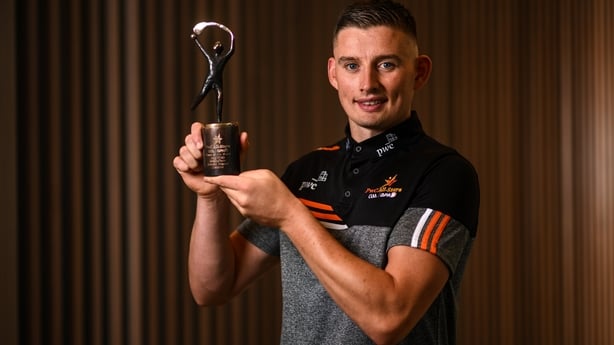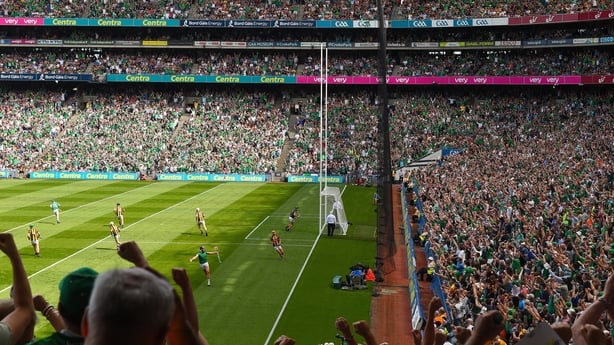What makes Limerick such a great hurling team?
Various theories have been advanced. A generational crop of players, whose talents were carefully nurtured in the county's academy system. The leadership of John Kiely and innovative coaching of Paul Kinnerk. The composure to stick to a highly effective game plan that has yielded four All-Ireland titles in five years.
But another factor that must be considered is adaptability.
Last year's Allianz Leagues didn't begin until May due to Covid-19 restrictions. Teams weren't officially allowed to train collectively until 19 April. But a long-embedded cultural fear of being caught on the hop by better-prepared opponents led several teams to breach that deadline, including some members of the Dublin football side that had just won six in a row.
Having won Liam MacCarthy just before Christmas, Limerick would have been expected to take a longer break than most of their rivals. But there was still scepticism when corner-back Sean Finn told RTÉ that he hadn't picked up a hurley until April, had taken a long break from physical training altogether and felt the better for it.
This didn't fit with the traditional GAA wisdom that the team who reigned supreme on All-Ireland final day - in a regular calendar year at least - was usually the one that had run up the most mountains in December or January. Surely it must be a bluff?
Limerick's league results seemed to confirm a work-in-progress though: They didn't collect two points until 5 June, their fourth Division 1 fixture. But they won every single game after that and hammered Cork in the All-Ireland final come August.
This year, the Treaty had to beat Offaly on the final day of the league to avoid relegation. League kingpins Waterford were being hotly tipped to challenge for their All-Ireland crown. Come July, another unbeaten championship ended with the three-in-a-row being secured. The Déise didn't make it to June.

Gearóid Hegarty, man of the match in the final against Kilkenny, tells RTÉ Sport that when the pandemic first forced a change of plans, the team management realised they had actually found a more effective way to approach the season.
"It was an eye-opener for us in terms of a different way to prepare," he says.
"You don’t always have to follow the status quo everyone has been following in the past, going back for the whole year, flogging yourself for nine or ten months and then only having a couple of games to play.
"We're not involved in terms of when the management want us to peak but I think they got it right. Last year they probably took a risk in terms of when we went back."
A similar approach was retained under this year's revised calendar, with the bulk of the traditional 'pre-season' work done during the league campaign in February and March ahead of the provincials throwing in in April.
"At the end of the day, the league is quickly forgotten about. The league champions are always well touted going into the championship but regardless of whether they go well or not it’s all about the championship.
"We put down a tough couple of months when we went back this year. We were getting a lot of flak in terms of how were performing in the league, people were writing us off but we knew that when the real stuff started we would be ready.
"We still absolutely went after every league game we played. We're such a competitive bunch even whether it's playing table tennis or a game of golf so we weren’t going through the motions. But we were training hard and I think we timed our run well.
"We're lucky that that is the approach and it has worked. The risk that they took has paid off."

Not that that meant Liam was easily retained.
"This year was much harder than 2020 or 2021 without a doubt," says Hegarty, who smashed 1-05 from play against the Cats.
"When you go back to the round-robin it's much harder because you pretty much have to play everybody.
"I was exhausted after the final this year. It was utter relief that the ref had eventually blown the whistle. You just took a deep breath in and thought 'Thank God' whereas the last couple of years you kind of knew the game was over in the last couple of minutes.
"We knew we had to raise our performance massively for the All-Ireland final. You don't get anything easy against Kilkenny. They’re an incredible county, just constantly producing hurlers every single year and they’re extremely hard to play against. Thankfully we did."
A month after the glamour of winning cups in front of 82,000 people, Hegarty is back playing Junior A hurling with his club St Patrick's.
Soggy sliotars and enthusiastic (sometimes multiple) man-markers have ensured a rapid "trip down back to earth" from the "pretty much professional" slickness of a modern inter-county setup.
"That's the club scene, it's like a different sport," he observes. "I'd be lying if I said it [the transition] was anything other than extremely tough.
"It's great to be involved at the same time. It's on such a smaller scale but it means so much because they are the lads that you would have grown up hurling with. Now my brother is on the team.
Excitement levels reached an all time high at Friday night hurling, as we welcomed county stars and St Patrick's clubmen Gearóid and Diarmuid Hegarty to present our U5 and U7s stars with medals and certificates. pic.twitter.com/jQLQuFZKlH
— St Patrick's GAA (@StPatsGAALimk) August 5, 2022
"We were in junior for a long time. We were up intermediate then for two years (2019-20). We're trying to get back up.
"There is so much work going on in my club at underage level. It will be a number of years I suppose before we see the fruition of that but it would nice to get them back up to intermediate for the crop of players that is coming through.
"I was down presenting medals at underage training recently and there must be 30 or 40 at every age. We are a really small club in inner-city Limerick so that is a massive achievement for us."
Hegarty also declares himself a "big fan" of the inaugural split-season system.
"There has been a bit of focus on the negatives around it. Yes, the season is condensed but there are so many positives associated with the split season as well.
"In my opinion, as a [club or inter-county] player what you want is games. You don't want a game followed by a five-week block of training before your next game. Club players are getting to play proper championship games on good surfaces.
"I know it was very shortened. I'm not saying it's the perfect solution; I don't think there is a perfect solution. Maybe it could be made slightly better, I'm not sure, but I thought this year was very beneficial. This year was a success, definitely."


